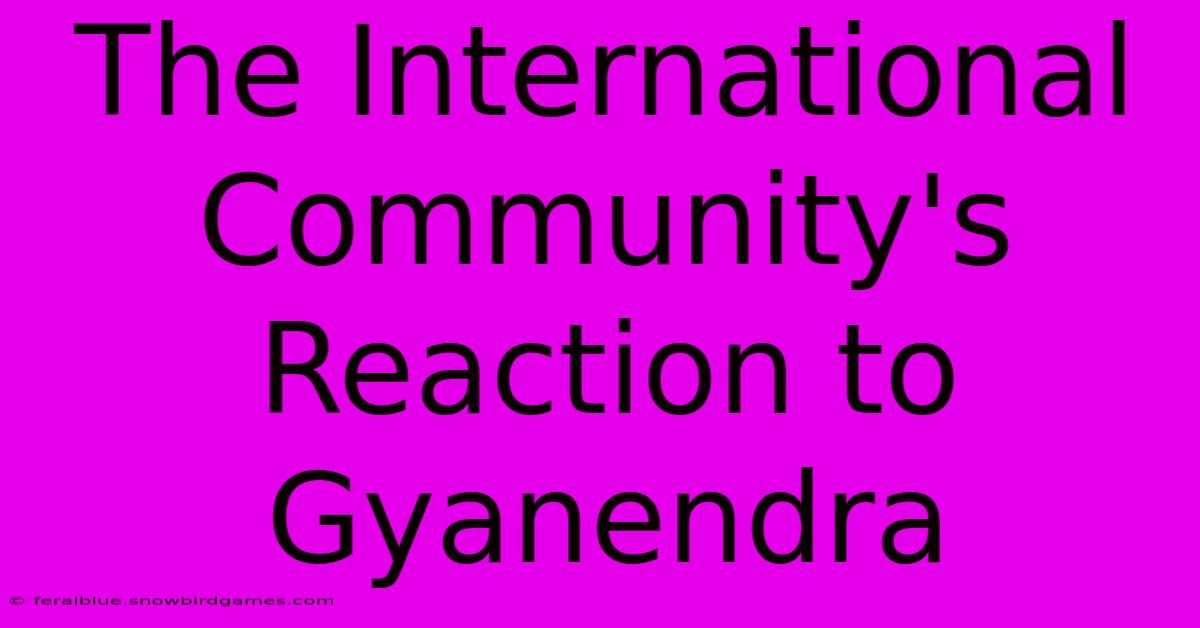The International Community's Reaction To Gyanendra

Table of Contents
The International Community's Reaction to Gyanendra's Kingship in Nepal
The reign of King Gyanendra of Nepal, marked by the 2005 royal coup, drew sharp and varied reactions from the international community. His seizure of power, ostensibly to quell Maoist insurgency, triggered a wave of condemnation and ultimately contributed to the end of the Nepali monarchy. This article delves into the nuanced responses from different global actors, analyzing the factors shaping their positions and the long-term consequences.
Initial Condemnation and Diplomatic Pressure
The immediate response to Gyanendra's February 1, 2005, power grab was overwhelmingly negative. Many countries, including key Western nations like the United States, United Kingdom, and Canada, voiced strong criticism. These condemnations centered on:
- Violation of Democratic Principles: The coup directly undermined Nepal's fledgling democracy and disregarded the established constitutional order. This was seen as a major setback for the country's political development and a threat to regional stability.
- Human Rights Concerns: Reports of human rights abuses under Gyanendra's rule fueled international concern. Restrictions on freedom of speech, assembly, and the press were widespread, raising alarms among human rights organizations and international bodies like the United Nations.
- Impact on Peace Process: The coup stalled the ongoing peace negotiations between the government and the Communist Party of Nepal (Maoist), jeopardizing the fragile peace process and increasing fears of renewed conflict.
These concerns translated into concrete diplomatic pressure. International donors, including significant contributors like India, European Union members, and the World Bank, threatened to withhold or reduce aid. This economic pressure aimed to incentivize Gyanendra to restore democratic governance.
Differing Approaches within the International Community
While condemnation was widespread, the international community's response wasn't monolithic. Some countries, particularly those with historical ties to Nepal or strategic interests in the region, adopted a more cautious approach.
- India's Complex Stance: As Nepal's largest neighbor, India faced a complex dilemma. While expressing concerns about the coup, India also sought to avoid actions that could destabilize the region further. India's policy involved a mix of public criticism and behind-the-scenes diplomacy aimed at promoting a peaceful resolution.
- China's Reserved Reaction: China, another important regional player, maintained a relatively reserved stance, emphasizing non-interference in Nepal's internal affairs. This reflected China's broader foreign policy approach, prioritizing stability and avoiding actions that might escalate tensions.
These contrasting approaches highlighted the diverse geopolitical interests and strategic considerations that shaped the international community's engagement with Nepal during this period.
The Rise of Popular Resistance and the International Response
The international community’s initial reaction was further shaped by the growing popular resistance to Gyanendra's rule within Nepal. The widespread protests and civil disobedience movements galvanized international support for the pro-democracy movement. International organizations and media outlets extensively covered the protests, amplifying the voices of the Nepali people and bolstering the pressure on Gyanendra. This strengthened the international consensus that Gyanendra's rule was unsustainable.
The End of the Monarchy and its International Implications
Ultimately, the combination of international pressure, domestic resistance, and the failure of Gyanendra's strategy led to the end of the Nepali monarchy in 2008. The international community largely welcomed the establishment of a republic, viewing it as a positive step towards democracy and stability in Nepal. The subsequent drafting of a new constitution and the holding of elections were seen as important milestones in this process.
However, the transition was not without challenges. The ongoing political instability and the need for economic development remain significant concerns. The international community's continued involvement through aid, technical assistance, and diplomatic support is crucial for Nepal's long-term stability and progress.
Conclusion: A Legacy of International Engagement
The international community's reaction to Gyanendra's reign provides a compelling case study of how international pressure can influence domestic political change. While differing approaches reflected varying geopolitical interests, the overwhelming condemnation of the coup and the consistent support for pro-democracy movements ultimately contributed to the end of the monarchy. This highlights the important role of international engagement in supporting democratic transitions and upholding human rights globally. The legacy of this period continues to shape Nepal's relationship with the international community, emphasizing the ongoing need for collaboration and support in its journey towards lasting peace and prosperity.

Thank you for visiting our website wich cover about The International Community's Reaction To Gyanendra. We hope the information provided has been useful to you. Feel free to contact us if you have any questions or need further assistance. See you next time and dont miss to bookmark.
Featured Posts
-
Aj Worth Wiki The Untold Chapters
Apr 02, 2025
-
The Legacy Of Pinky Dhaliwals Son
Apr 02, 2025
-
Kim Sae Ron Age A Look At Her Filmography
Apr 02, 2025
-
Haris Raufs Son More Than Just A Cricketers Child
Apr 02, 2025
-
Sketch Age Master The Art Of Line And Form
Apr 02, 2025
